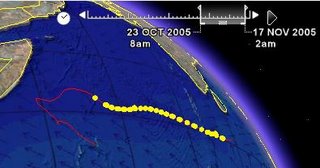Are your users stuck in "P" mode?:
For most of us, the problem was NOT that we couldn't learn how to use anything but automatic "P" mode. The problem was that we didn't know why or when to use anything else.
It wasn't simply a camera problem--it was a photography problem. The camera manuals describe precisely how to turn the dials and push the buttons, but never tell us why we'd want to. They focus on the tool rather than the thing the tool enables (taking pictures). What good does it do to master a tool if we haven't understood (let alone mastered) the thing we're using the tool for?
Sounds a lot like some of the new ESRI effort around documentation that was announced at the GIS Faire/User Conf...I think the user community aspect is big too, whether it's a conference or a BBS to share data on, community builds that common knowledge amongst users that can grow far beyond what the actual creators of a product know about what can be done with it...
I think about the tutorial style of books with a big example to follow, versus an API reference. Or the cookbook approach...how to X. Have any GIS books come out with a Cookbook approach? The closest thing I have seen is GoogleMaps Hacks- a neat collection of things to do with maps.
I think it is useless to argue about what is or isn't a GIS. For example, I have seen it written in a couple of places that Google Earth isn't a GIS. It certainly seems to meet the literal definition. I think Google Maps is a GIS as well. Why waste time with the label when you can just talk about specific capabilities?

